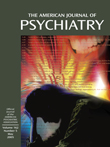Psychotropic Medication and Stroke Outcome
To the Editor: The number of elderly people will increase dramatically in the next few years. Many of them are given prescriptions for psychotropic drugs, such as antidepressants, antipsychotics, and hypnotics, to treat behavioral disturbances related to dementia. The same elderly patients are at a high risk of cerebrovascular events, which potentially could be exaggerated by concomitant psychotropic medications. A report (1) suggested that risperidone possibly increases the risk of cerebrovascular adverse events in the elderly. There is now a concern that discontinuation of risperidone may lead to a switch to conventional antipsychotic drugs, such as haloperidol (2), which is known to retard functional recovery after cerebrovascular events (3).
We have studied the safety of risperidone in aged male rats subjected to small cortical stroke. The experimental design tried to model clinical practice in which elderly patients who have sustained a small focal stroke or who are at a high risk of stroke are given psychotropic medication. The rose bengal model was selected to produce a cortical infarct in rats because the brain pathology is well characterized, the cortical lesion produced is consistent, and the lesion has a precise location and size. Aged rats were used since they might be more vulnerable to brain insults acutely and chronically. The rats were treated daily with risperidone before and for 3 weeks after ischemic injury. To assess neural and functional outcome, we used a new ledged-beam walking test that can detect motor deficits with a high sensitivity and a challenging match-to-place water maze test, followed by histological analyses.
Risperidone transiently worsened behavioral impairments during drug exposure but did not affect the extent of tissue damage or long-term functional outcome. This is consistent with recent work in the Journal by Nathan Herrmann, M.D., F.R.C.P.(C.), et al. (4). Perhaps the alarming reports on risperidone, which could lead to use of nonatypical neuroleptics, should be reconsidered. Previous epidemiological studies (1) have been characterized by a low number of patients, polypharmacy, other diseases, compliance, and/or appropriateness of use. We suggest that additional controlled experimental approaches might better address the safety of psychotropic drugs.
1. Wooltorton E: Risperidone (Risperdal): increased rate of cerebrovascular events in dementia trials. CMAJ 2002; 167:1269–1270Medline, Google Scholar
2. Fowlie D: CSM warning on atypical psychotics and stroke may be detrimental for dementia. BMJ 2004; 328:1262Medline, Google Scholar
3. Goldstein LB (Sygen in Acute Stroke Study Investigators): Common drugs may influence motor recovery after stroke. Neurology 1995; 45:865–871Crossref, Medline, Google Scholar
4. Herrmann N, Mamdani M, Lanctôt KL: Atypical antipsychotics and risk of cerebrovascular accidents. Am J Psychiatry 2004; 161:1113–1115Link, Google Scholar



